Coronavirus: One year since NI's first Covid-19 death
- Published
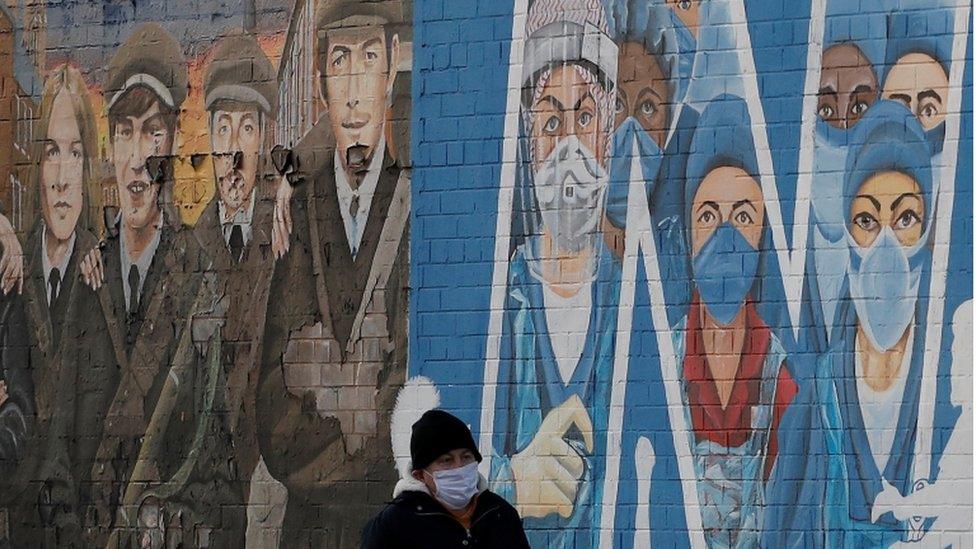
Friday marks one year since the first death related to Covid-19 in Northern Ireland.
The patient was an elderly man who had an underlying medical condition and was being treated in a hospital in the greater Belfast area.
He was among the 77 people who had tested positive for the virus in the three weeks leading up to 19 March - the first positive case was reported on 27 February.
Since then, more than 2,100 people here have died with the virus and 115,511 have been infected, with many still feeling the effects.
One year on, we remain in a lockdown, although home-schooling will come to an end for primary school pupils on Monday.
With the vaccination roll-out continuing and governments around the UK - including at Stormont - beginning to look at easing restrictions, there is some hope that brighter days are ahead.
Here, we take a look at the last 12 months of coronavirus in Northern Ireland.

February
The first case of Covid-19 in Northern Ireland was diagnosed in a woman on 27 February.
She had been in northern Italy - an area which emerged as a major centre of infection in Europe - and flew into Dublin Airport before travelling onto Northern Ireland.
March
Schools in the Republic of Ireland closed on 13 March, and subsequently the first sign of divisions appeared within the Northern Ireland Executive over its handling of the crisis.
The executive issued an agreed response to keep schools open, but - 12 hours later - Deputy First Minister Michelle O'Neill broke ranks and insisted that schools should close immediately.
It was a few days before First Minister Arlene Foster announced that schools would close to most pupils and staff.
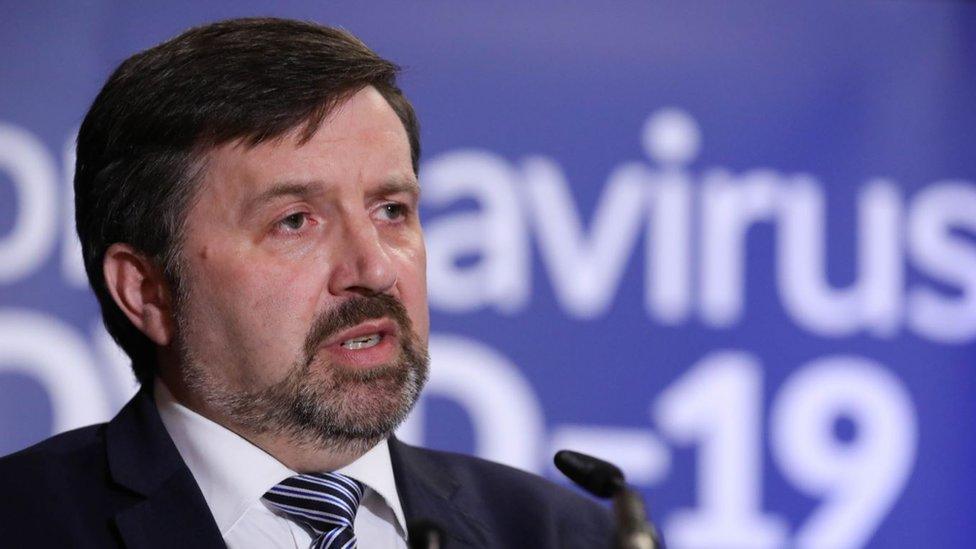
The health minister warned that thousands could die if people did not adhere to public health advice
On 19 March, the first coronavirus-related death in Northern Ireland was confirmed.
He said there could be 14,000 to 15,000 deaths, adding, "that is the nightmare, worst-case scenario".
This led to new powers to enforce guidelines coming into force on 28 March, which would require people to stay at home and businesses to stay closed.
April
There was a revised warning at the beginning of the month that Northern Ireland could see 3,000 deaths in a "first wave" of the pandemic.
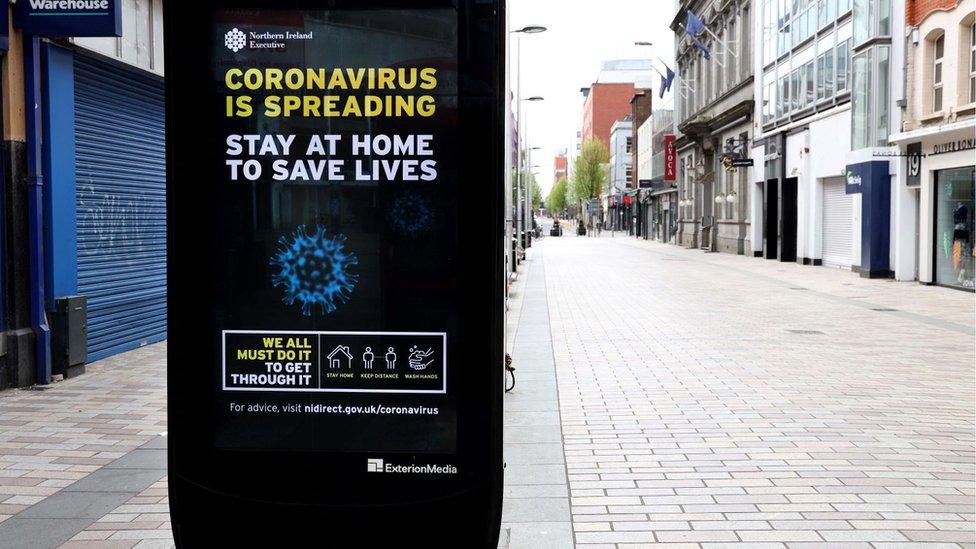
The streets of Belfast city centre were deserted during the lockdown of Spring 2020
But expert modelling also indicated that there could be a second wave later in 2020, in the absence of a vaccine or sufficient population immunity.
Three weeks later, that figure was revised again.
The health minister said that Northern Ireland could see 1,500 deaths in the first 20 weeks of the Covid-19 pandemic.
Covid-19: Stormont's key coronavirus moments
A shortage of personal protective equipment (PPE), such as gloves, face masks and aprons, was a major issue at the beginning of the pandemic.
A joint order between the Republic of Ireland and Northern Ireland was not completed, despite Finance Minister Conor Murphy saying it had been agreed.
Eventually it seemed the PPE problem was resolved with the health minister saying there was a "sufficient" amount in April.
May
The pandemic's fourth month in NI brought the first glimmers of hope, with the NI Executive announcing a five-phase blueprint for lifting restrictions.
On 18 May, garden centres and recycling centres reopened and marriage ceremonies where a person is terminally ill were also allowed.
But, by the end of the month, the Northern Ireland Statistics and Research Agency (Nisra) revealed that nursing home residents had accounted for more than half of Covid-19-related deaths in Northern Ireland.
June
All non-essential retailers were allowed to reopen on 12 June. Economy Minister Diane Dodds described the announcement as a "major step forward".
But there were backward steps too.
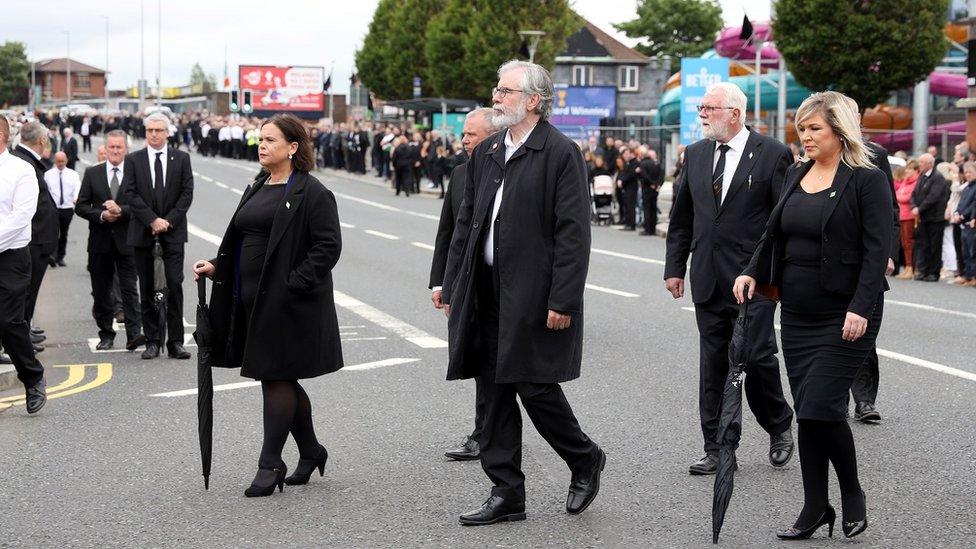
Sinn Féin's leader Mary Lou McDonald (left) and deputy leader Michelle O'Neill (right) attended the funeral, along with former leader Gerry Adams (centre)
The attendance of Deputy First Minister Michelle O'Neill at the funeral of republican Bobby Storey led to the biggest crisis in NI politics since devolution was restored in January.
July
This month marked the opening of much of the hospitality sector and beauty industry.
During the first lockdown, mask wearing was not mandatory but as society began to emerge from lockdown there was a move towards encouraging the public to wear them.
The wearing of face coverings on most buses, trains and ferries then become mandatory in Northern Ireland from 10 July.

Meanwhile, Northern Ireland launched its Stop Covid app at the end of July too - becoming the first part of the UK to do so., external
August
This was the month of exam drama.
With exams cancelled earlier in the year, A-level and AS-level results were calculated using a mixture of teacher-predicted scores and a Department of Education algorithm.
But Education Minister Peter Weir made a U-turn when more than a third of teacher-estimated grades were lowered in the final results issued on 13 August.
Four days later, after widespread criticism over how grades had been handed out, he announced that students would be awarded the highest grade either predicted by their teacher or awarded using the algorithm.
September
It was September before First Minister Arlene Foster and Deputy First Minister Michelle O'Neill started to appear at press briefings together again, after the fallout from Bobby Storey's funeral.
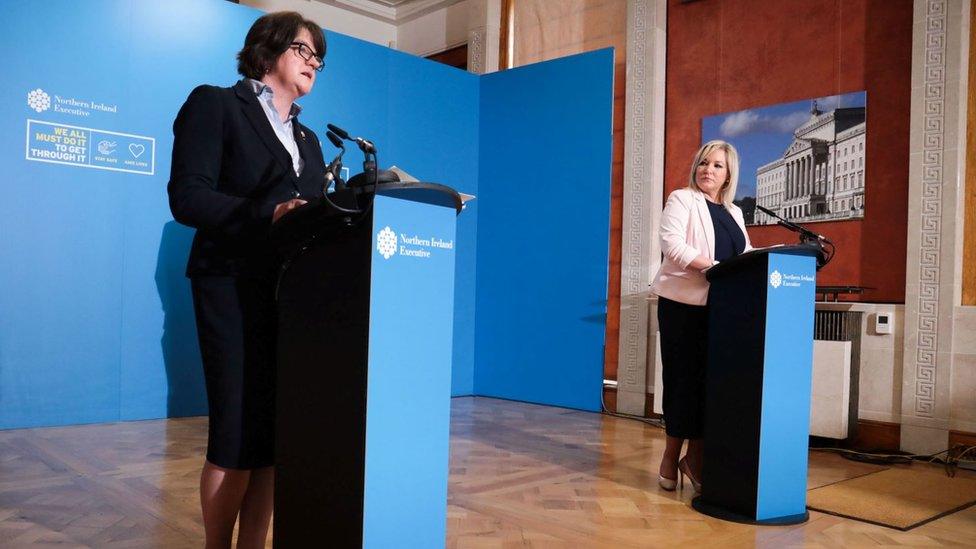
Arlene Foster and Michelle O'Neill held their first joint briefing in more than two months
On 21 September, they announced that Covid-19 restrictions, including no mixing of households indoors with some exceptions, and a limit of no more than six people from two households meeting in a garden, would tbe extended to all of Northern Ireland.
The announcement came after more than 1,000 people tested positive for Covid-19 in seven days.
October
Northern Ireland became the first of the four UK administrations to roll out a contact-tracing programme, as part of its plans to tackle coronavirus.
But cases continued to rise and the executive announced schools would close again and pubs and restaurants would face tighter new restrictions.
November
Stormont talks were deadlocked over lifting Covid restrictions.
Ministers agreed to extend restrictions for one more week with a partial reopening of some sectors, but much of the hospitality sector, as well as hair and beauty salons, remained closed.
December
On 2 December, it was announced that the UK had become the first country in the world to approve the Pfizer/BioNTech coronavirus vaccine.
Covid vaccine safety: How does a vaccine get approved?
Margaret Keenan, 90, originally from County Fermanagh, became the first person in the world to be given the jab.
The first Covid-19 vaccine in Northern Ireland was then given to nurse Joanna Sloan on 8 December. before being rolled out in nursing homes.
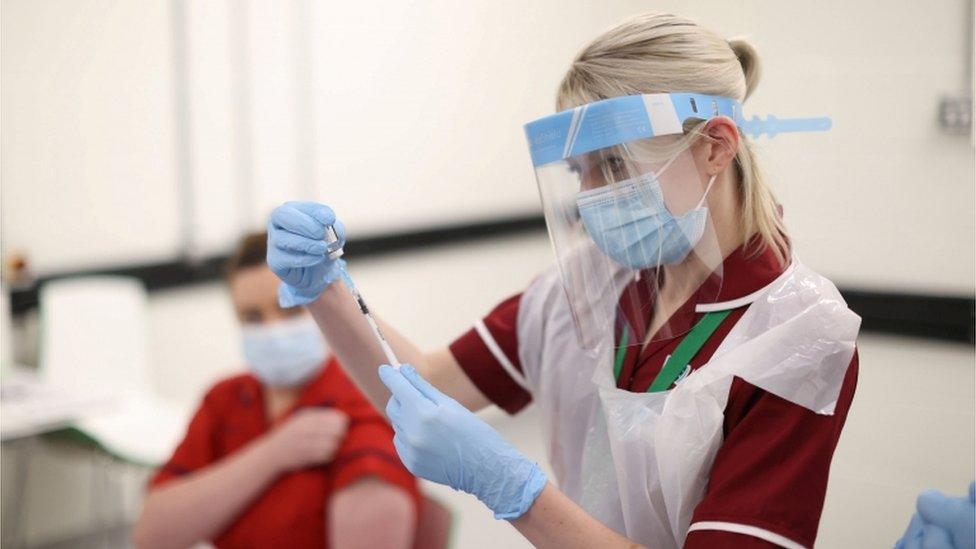
A nurse practitioner fills a needle with the Covid-19 vaccine before administering it to Sister Joanna Sloan
While the vaccine sparked some hope, a rise in Covid-19 cases led to the NI Executive cutting the planned Christmas "bubble" period to just one day.
Northern Ireland then entered lockdown again on 26 December.
January
The new year marked the start of another round of home-schooling and the rollout of the Oxford-AstraZeneca vaccine.
Eileen Lynch, 94, was the first person in Northern Ireland to receive the Oxford-AstraZeneca coronavirus vaccine
As more people received their first - and in some cases second - doses of the vaccine, lockdown was extended.
While a range of financial measures have been in place since March to help individuals and businesses, many business owners felt that they had been "left in the dark".
February
Twelve months on from the first case of Covid-19, more than 500,000 Covid-19 vaccination doses had been administered in Northern Ireland, according to the Department of Health.
The majority of adults are expected to be offered a vaccine by the summer.

Restrictions were extended again until the start of April, with Stormont ministers saying that they want to keep driving down infection rates so that the eventual reopening is much more sustainable.
March
As Northern Ireland continues to edge closer to the lifting of lockdown, children in primaries one to three were permitted to return to school on 8 March.
All primary school pupils will return on 22 March, along with post-primary students in years 12-14.
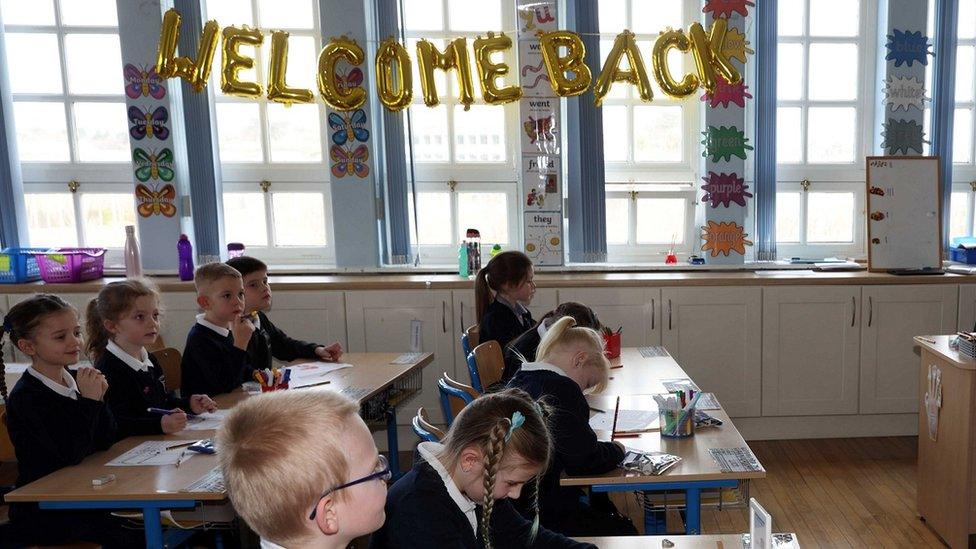
Infection rates are down on February, and there are fewer people in hospital.
While there have been days when the number of deaths has risen, the overall death rate remains low compared with the previous two months.
In Belfast's Holyland area, St Patrick's Day was more peaceful than in previous years as the majority of students complied with Covid-19 restrictions and refrained from street parties, although police were called to clear crowds of young people from the nearby Botanic Gardens.
People aged 50 or over in Northern Ireland have been invited to book their Covid-19 vaccine appointment, but vaccine delivery issues could put the rollout plan back by four weeks in a "worst-case scenario", the head of NI's vaccination programme has said.
By 11 March, 629,461 people had received their first vaccination.
It has been a long year, with many families, businesses and people deeply affected by the pandemic. Many will be hoping that this is the only year in which Covid-19 so drastically alters the daily lives of so many people - and that there are better days ahead.
Related topics
- Published29 July 2021
